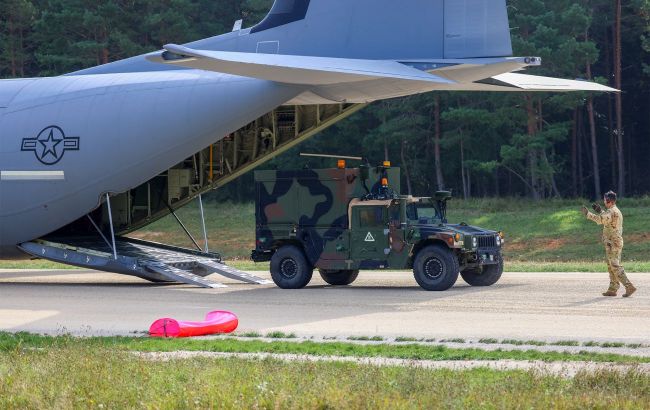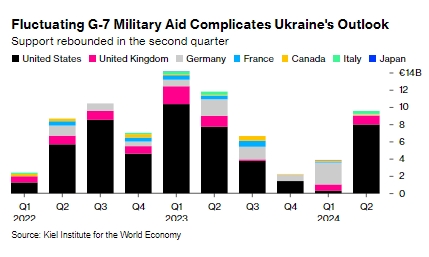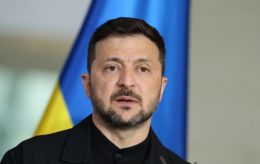Arms supply at risk due to financial difficulties of Ukraine's allies - Bloomberg
 Photo: Arms supply at risk due to financial difficulties (Getty Images)
Photo: Arms supply at risk due to financial difficulties (Getty Images)
Arms supplies to Ukraine next year are at risk, as some allies are struggling to secure funding while others refuse to increase financial assistance to Kyiv, according to Bloomberg.
According to one anonymous source, the dynamic shows that Russia's economy is in a state of war, while Ukraine's allies are not.
A significant portion of military support for Ukraine in 2025 is tied to the G7 agreement to provide loans worth $50 billion from the profits generated by frozen assets of the Russian central bank.
Allies are still negotiating the final details of this deal, and the US is seeking assurances that Hungary will not block the European Union's measures. The final figure may be lower if no agreement is reached.
However, even if a deal is struck, $50 billion is still insufficient to meet Ukraine's needs for another year of war, and allies will have to go beyond this financing framework, according to sources.
US assistance
This week, President Volodymyr Zelenskyy is in the US, presenting a victory plan to President Joe Biden. The package depends on security guarantees, such as an invitation to join NATO, which the Ukrainian leader believes are necessary to increase pressure on Russian President Vladimir Putin to stop the war.
However, the assistance has been overshadowed by friction with Republican candidate Donald Trump, who initially attacked Zelenskyy but later agreed to meet with him. Trump suggested that Ukraine make a deal with Moscow, whose forces are making progress in the eastern part of the Donetsk region and have partially destroyed Ukraine's energy system.
Ukraine’s budget deficit
These issues are compounded by a funding shortfall. The Ukrainian government projects a budget deficit of 19% of gross domestic product in 2025 — about $35 billion.
More than half of this sum will be provided by the International Monetary Fund and the EU, but an additional $15 billion will still be needed to balance the budget. According to officials, some loans from G7 countries may be required to cover this deficit.
Military assistance
In addition to this, there is military financing. The $50 billion allocated by the G7 is roughly equivalent to the military aid the US and key European allies provided from January 2023 to June of this year. The US provided around €31.5 billion during this period, while Germany, the UK, France, and Italy contributed around €15.7 billion together, according to data collected by the Kiel Institute.

These figures may not include all military support sent to Ukraine, as some countries do not disclose the full extent of their aid. In other cases, pledges have not yet been fulfilled. Among other needs, the Ukrainian army relies on its allies for artillery shells, missiles, and additional air defense capabilities.
According to Bloomberg’s anonymous sources, the looming financial crisis among Ukraine’s allies comes at a dangerous time and could force Kyiv to enter negotiations from a position of weakness.
Next year will be especially decisive, as Russia's economy may face increasing pressure in 2026, potentially undermining Putin’s belief that time is on his side, according to the assessment of one European government.
Nevertheless, this assessment assumes that the outcome of the US elections in November, where Trump is expected to have a tight race with Vice President Kamala Harris, will not change the dynamics of the conflict before then.
Moscow, whose production is supported by supplies from Iran and North Korea, continues to invest budgetary funds into military needs. Russia plans to spend $142 billion on the war in 2025, which will amount to 6.2% of gross domestic product. Defense and security spending is expected to account for around 40% of Russia's total budget expenditures in 2025.
Issues in Europe
Ukraine’s European allies face their own fiscal constraints. Constitutional debt limits restrict German Chancellor Olaf Scholz’s government and has reduced direct funding for Kyiv. France has a new government after a turbulent election season, and the EU is pressing it to cut its deficit. Prime Minister Giorgia Meloni’s fractured coalition in Italy may be tied down by spending commitments.
According to agency sources, real negotiations in Brussels over the new EU budget, as well as any discussions about joint borrowing to increase defense spending by hundreds of billions of euros, are likely to be postponed until after Germany’s elections.
Even support from the UK, a staunch ally that has often been the first to supply advanced weaponry, appears to have waned recently. Prime Minister Keir Starmer told voters they are in for tough times as he seeks to reduce spending, though he also stated at the UN that the UK’s support for Ukraine is "unwavering."
Meanwhile, promises from allies regarding NATO continue to be logged. Biden has announced nearly $8 billion in new military aid to Ukraine and has convened a meeting with key allied leaders to coordinate additional support when he visits Germany next month.
In an announcement coinciding with Zelenskyy's visit to the White House, it was stated that Biden has instructed the Pentagon to allocate all remaining assistance to Ukraine by the end of his term. The Department of Defense is also preparing an initial package, which includes additional air defense systems, drones, and ammunition.

